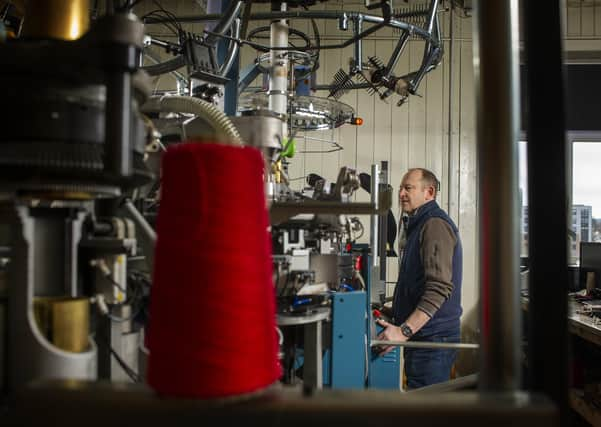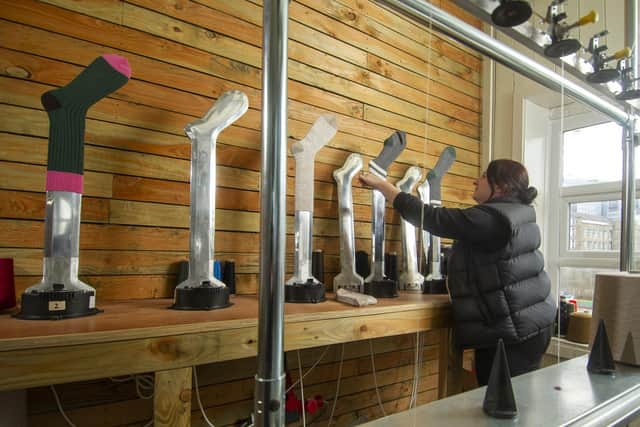Meet the man single-handedly manufacturing socks from a mill in Bradford


Inside a mill once owned by renowned textile employer Sir Titus Salt, Mark Hill is the one-man band behind The Bradford Sock Company.
Since launching four years ago, his sock production has been from a single machine in the premises of Edward Hill & Co Ltd, the knitting wool firm founded by his father in the 1980s, which he took on just over a decade ago.
Advertisement
Hide AdAdvertisement
Hide AdHowever, production capacity at the site, in the heart of Bradford, has doubled in recent months, with a second sock-knitting machine now up and running to meet demand.


Across the two machines, Mark can make between 100 and 200 pairs a day.
He typically does short runs – only 50 pairs or so. “Somebody else wouldn’t even entertain 50 pairs,” he says. “They’d want (to be making) a thousand.
“And they won’t have one or two machines, they’ll have a factory of 30 or 40 and will have to keep them constantly running.”
Advertisement
Hide AdAdvertisement
Hide AdSmall scale has worked for Mark so far, though. He has had commissions from clothing brand Belstaff, with whom David Beckham has collaborated, as well as local shops and Hebden Bridge-based menswear brand HebTroCo.
“I haven’t had to go out for clients,” he says. “They have come to me. I haven’t gone knocking on doors. I’ve built a website and if you search for British sock manufacturers, there’s not many. But people are looking all the time for this sort of thing.”
In fact, it was out of a request from an Edward Hill & Co customer that The Bradford Sock Company grew.
“The customer asked whether I could make some socks. I had no idea how you made them,” Mark recalls.
Advertisement
Hide AdAdvertisement
Hide Ad“Generally though, if somebody puts something to us we look into it. Because a lot of the (textile) companies that aren’t here today have just done one thing – like spinning or dyeing - we’ve constantly done new things.”
Supported by a European funding grant through Bradford Council, Mark established the new brand, heading off to ‘sock school’ in Italy, where, armed with samples, he chose his first production machine and embarked on a course to learn how to use it.
“I found this agent who supplies these machines and I don’t think he took me seriously at all because to be honest, you wouldn’t really go and buy one machine.
“People who buy sock machines have got a factory and they’re adding to them or replacing them. The smallest factory I’ve been to has 30 machines.
Advertisement
Hide AdAdvertisement
Hide Ad“I was going to see the machine being built in the factory, to literally see it being put together so that if anything went wrong with it, I’d see how it had gone on.”
When the £40,000 machine arrived in the UK, Mark was given support over two weeks to programme it for the designs he wanted to create. That machine is now almost at its maximum capacity for a year’s production.
It led to the new addition, which is not quite the same, programmed to produce a slightly thinner sock, but it is proving popular, with work lined up for a third of the year.
“Initially, I had one customer who almost kept the original machine going all the time.
Advertisement
Hide AdAdvertisement
Hide Ad“From then, other people who would come to us (Edward Hill & Co) for knitting wool would start asking about making socks from it. You can only sell so much knitting wool at the end of the day but if they can sell a tonne of knitting wool and 200 pairs of socks, then they’ve expanded their market as well. So for quite a few of the existing customers, we now make socks.
“We also get people ringing up who find us on the internet or see us on Instagram.”
A lot of Mark’s clients are small, independent shops. A short run of orders for them means the machine isn’t tied up for weeks and “when somebody goes into their shop and sees the socks, you then get other people starting to think ‘ooh, I’ll go and have a look about putting some of them in my shop’. It’s snowballed from there really.”
Mark reckons certain colours sell better in certain areas. “For example, the Bradford City colours will be most popular in Bradford but a shop in Leeds will sell more yellow, blue and white socks, because of Leeds United. We will make what people want.”
Advertisement
Hide AdAdvertisement
Hide AdAs well as handling commissions from various shops and companies, Mark creates his own range of designs and colours, selling the socks on his website, with pairs also available to buy in the Edward Hill & Co mill.
Special commissions have been designed on yarn spun and dyed in Huddersfield. The socks are washed, left to dry until slightly damp and then put on foot-shaped sock irons, aptly known as ‘hot legs’, before being packaged.
“People are constantly looking for new things,” Mark says.
“And say if there’s only a few pairs of a certain colour combination left, shops will buy them. Then if somebody goes in their shop and thinks ‘I’ll go home and buy that sock online’, they can’t. They have to get it in their store so they go back.”
The mill in which the socks are made was built in 1826, for the spinning of worsted yarn and employed more than 100 people in its heyday.
Advertisement
Hide AdAdvertisement
Hide AdOwned for a period by Sir Titus Salt, a textile industrialist best known for having built Salts Mill, today the mill is split into two halves, one of which has been occupied by Edward Hill & Co since the firm’s launch in 1983.
Just one room within that is set aside for the manufacture of socks. Most of the space is dedicated to the production and distribution of knitting yarn, including machines that steam and thicken the material, reel it into hanks and wind it into balls.
Edward Hill & Co supplies it to people all over the world, sending out around four tonnes every week.
“Our biggest customer at the moment is in France,” Mark says. “They’re a mother and daughter team. They started really small, ordering one box and then two and now they’ve just taken four palettes of yarn.”
Advertisement
Hide AdAdvertisement
Hide AdAt its peak, the company employed 40 staff and distributed more than ten tonnes of yarn a week. Today, things are scaled back and there are just 10 employees.
Mark, who joined the firm in a warehousing role in 1989, says the higher value of yarn has helped the company to survive.
“Now we are part of this bigger chain of events almost,” he says.
“The cheaper yarns that we used to do here are now done in China or Turkey, because they’ll do them for next to nothing.”
Advertisement
Hide AdAdvertisement
Hide AdThe sock production has allowed the firm to diversify under a new brand, whilst remaining true to its roots and to its home city.
“I know the yarn is going through a sock machine and it’s a different product coming out, but it’s almost the same as the other machines. You put some yarn behind it and a product comes out – in this case a sock,” Mark says.
“There’s not many people making them. I’ve joked about being Yorkshire’s largest sock manufacturer – and I only had one machine.”
www.thebradfordsockcompany.co.uk
Comment Guidelines
National World encourages reader discussion on our stories. User feedback, insights and back-and-forth exchanges add a rich layer of context to reporting. Please review our Community Guidelines before commenting.